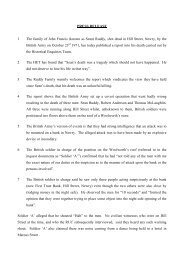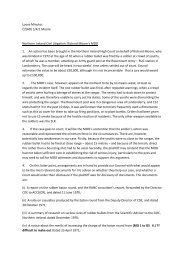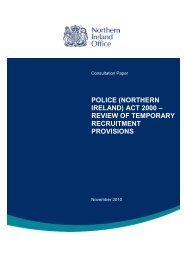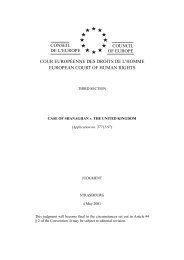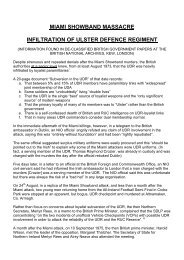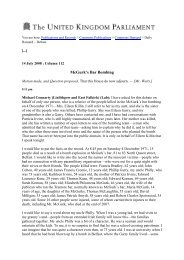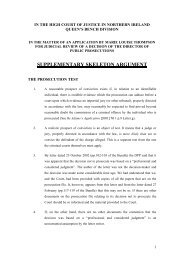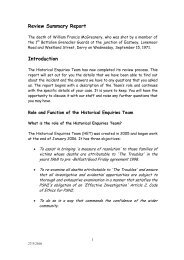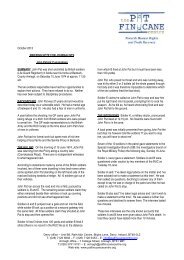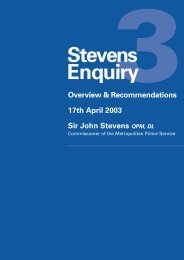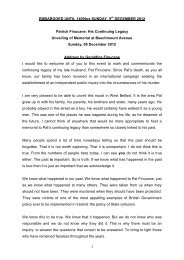British Irish Rights Watch - The Pat Finucane Centre
British Irish Rights Watch - The Pat Finucane Centre
British Irish Rights Watch - The Pat Finucane Centre
- No tags were found...
Create successful ePaper yourself
Turn your PDF publications into a flip-book with our unique Google optimized e-Paper software.
BIRW URGES Parliament not to pass the Prevention of Terrorism Bill because it raisesfundamental issues of human rights and public policy and will cause seriousoperational problems for the police, particularly but not only in Northern Ireland.Human <strong>Rights</strong> Concerns<strong>The</strong> control orders proposed in Clause 1 of the Bill give the Secretary of State thepower to impose any obligation on anyone suspected of involvement interrorism-related activity. This is a draconian power which is couched in thevaguest of language. <strong>The</strong> subject of a control order need not have committedany crime. Experience tells us that such laws are wide open to abuse.Control orders have the potential to impose internment without trial. Althoughthe courts will have the power to review control orders depriving an individual ofliberty within seven days [Clause 2], and persons made the subject of a controlorder will have the right of appeal, they will not be able to challenge the controlorder in any other court [Clause 9]. Northern Ireland experience has shown thatreview by a court after the fact, for example the granting of bail in terrorist cases,is all too often a rubber-stamping exercise. Parliament should not allowthemselves to be fooled by the inclusion of a judicial figleaf that this Bill is not trulya naked attack on civil liberties in this country.Although the Bill deals with situations which violate a person’s right to liberty underArticle 5 of the European Convention on Human <strong>Rights</strong>, it makes no mention ofthe many other human rights that control orders have the capacity to violate.Nor does it refer to the UK’s obligations under a range of other human rightstreaties, such as the International Covenant on Civil and Political <strong>Rights</strong>, theConvention against Torture or the Convention on the <strong>Rights</strong> of the Child.Under this Bill, a person could be held incommunicado, in solitary confinement, inconditions far harsher than they would experience in a prison. <strong>The</strong>ir rights tofamily life, to privacy, to freedom of conscience, to freedom of expression, tofreedom of association, and above all to the right to a fair trial could all beaffected by control orders. Not only they, but members of their family, may alsobe affected.<strong>The</strong> Bill does not set out the rules of evidence for hearings concerning controlorders, but makes provision for special rules of court in the Schedule to the Bill. It isclear that the government intends to use these rules to withhold information fromsuspects concerning the allegations against them, and to exclude both suspectsand lawyers from hearings. Such provisions fly in the face of the right to a fair trialand abrogate the principle that all persons are equal before the law. A particularconcern is that only suspicion of involvement in terrorism is required, rather thanproof, and that such suspicion may rely on intelligence based on confessions orinformation extracted under torture.As if all that were not enough, the numbers involved are so small that suchmeasures are unjustified and, as the House of Lords pointed out, disproportionate



